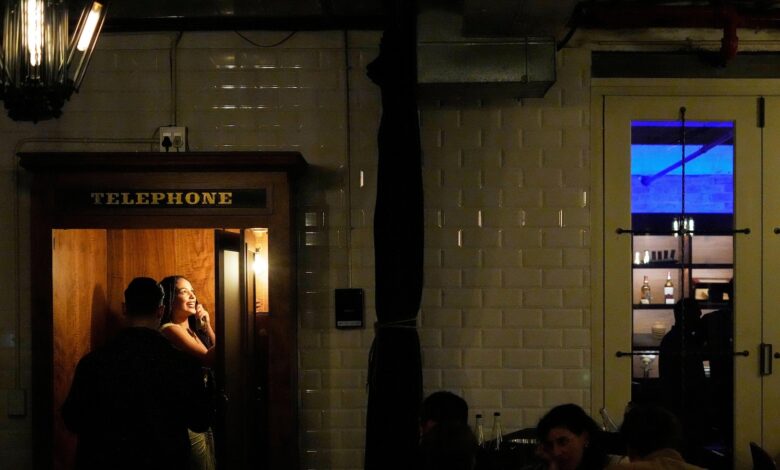A jazz club in Johannesburg plays its last songs and laments downtown’s decline

JOHANNESBURG — As night falls in downtown Johannesburg, far removed from the affluent suburbs that house some of Africa’s wealthiest residents, clusters of men gather on dimly lit streets while a security patrol speeds by.
Just around the corner, the renowned jazz venue known as the Marabi Club is hosting its final Friday night performance before shutting its doors – another casualty of the deterioration of the city center and the stark inequality that persists in post-apartheid South Africa.
“It’s heartbreaking. This venue holds such historical significance in the heart of the city and now we have one more reason to avoid coming downtown. It’s a clear indication of the city’s decline,” lamented Renata Lawton-Misra, a 34-year-old climate change consultant, who was attending the concert with her husband, Kyle Schutte.
According to Schutte, the reason behind the closure is evident. “Safety concerns,” stated the 38-year-old financial consultant, who admitted he would typically steer clear of the area. Downtown is now synonymous with high crime rates and crumbling infrastructure following the mass exodus of white residents to the suburbs after the dismantling of the apartheid regime in 1994. “Whether true or not, it’s all about perception,” he added.
The Marabi Club was established as part of a revitalization effort in downtown Johannesburg, particularly in the Maboneng district, around a decade ago. Founded in 2017 by TJ Steyn, son of the late South African insurance tycoon Douw Steyn, and Dale De Ruig, the club drew in visitors such as Jay Z and Beyonce.
“Look at the incredible ambiance we’ve created here with exceptional food and music,” remarked waiter Emanuel Mcotheli, gesturing towards the diverse crowd of predominantly Black urban professionals.
The club paid homage to marabi, a jazz movement that emerged in the 1920s, celebrating South Africa’s vibrant musical legacy. During that era, miners and laborers would congregate in downtown areas, drawn to the rhythmic and improvisational keyboard tunes of marabi emanating from illicit shebeens (taverns).
Popular bands like the Jazz Maniacs and influential artists such as Hugh Masekela and Miriam Makeba propelled the genre to fame.
“I grew up singing marabi,” revealed the club’s resident vocalist, Mbalizethu Siluma, 40, who specializes in soul and R&B, encouraging the elegantly dressed guests to hit the dance floor after dinner.
Despite the club’s acclaim, South Africa’s stringent COVID-19 restrictions dealt a severe blow to its operations and other businesses aiming to rejuvenate downtown Johannesburg. A series of short-lived mayors, totaling eight in five years, exacerbated the situation as crucial infrastructure projects remained unfinished.
The neglect of downtown Johannesburg garnered global attention in 2023 when a tragic fire in an overcrowded apartment building, left unregulated by authorities, claimed the lives of 76 individuals.
“We were aware that opening a jazz club here wasn’t without its challenges, but we remained optimistic about the upward trajectory,” reflected De Ruig in an interview with The Associated Press. “Unfortunately, it turned out to be a false start.”
He noted that the city provided minimal support, overlooking basic requests for enhanced lighting, security, and sanitation in the vicinity.
While the city administration declined to comment on the closure of a private establishment, spokesperson Nthatisi Modingoane expressed regret over the impact on the creative economy.
For Lusanda Netshitenzhe, a member of the Joburg Crisis Alliance steering committee focusing on combating corruption and enhancing municipal services, the Marabi Club’s closure underscores broader systemic issues.
“Unfortunately, people no longer feel safe venturing into Maboneng,” observed Netshitenzhe. The area that was once a beacon of hope “is now in decline due to persistent systemic challenges, inadequate urban governance, and a lack of leadership in the city of Johannesburg.”
Mayor Dada Morero acknowledged in his recent State of the City address that “extraordinary times call for extraordinary measures” and pledged to intensify efforts to revitalize the inner city, including refurbishing abandoned structures and installing public lighting.
However, any plans for rejuvenating the area come too late for the Marabi Club and its musicians.
“Perhaps there is something better on the horizon… look at the vibrancy of this place, Marabi is not fading away,” asserted Siluma before taking the stage.
De Ruig and his partner are contemplating relocating the club to Steyn City, a gated residential and commercial estate owned by the Steyn family, situated 32 kilometers (20 miles) north of downtown Johannesburg.
Downtown is now left to those who cannot afford to depart.
___
More AP Africa news: https://apnews.com/hub/africa





